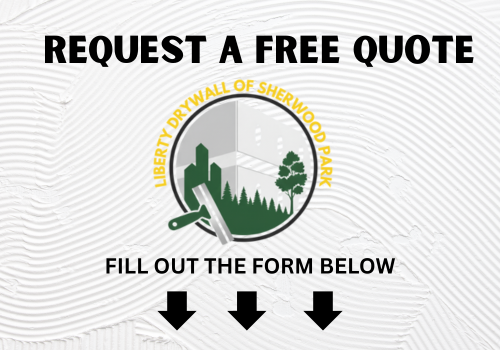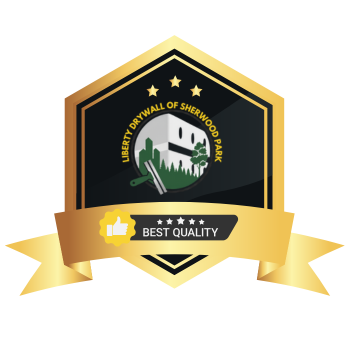Curved & Radius Services in Sherwood Park, AB
Curved and radius drywall work adds architectural elegance that transforms ordinary interiors into standout spaces. At Liberty Drywall Sherwood Park, we specialize in curved drywall installation, radius wall construction, and drywall arch design for both residential and commercial properties.
Our professional drywall contractors combine specialized tools, precise measurements, and years of experience to create seamless curves, flowing ceilings, and smooth radius finishes that elevate your design. Whether you’re installing an arched doorway, a custom curved ceiling, or a detailed radius wall, our team delivers superior craftsmanship and lasting durability.
From initial framing and drywall bending to final sanding and texturing, Liberty Drywall Sherwood Park ensures every curve meets your vision with flawless results. Call 587-418-8862 today for expert curved
drywall installation services in Sherwood Park, Alberta.

Liberty Drywall of Sherwood Park (CP)

Curved and Radius Drywall Installation Services
Curved drywall installations require specialized techniques that differ significantly from standard flat wall applications. Professional contractors use wet and dry application methods depending on the radius requirements, along with precise bending and shaping processes to achieve seamless curved surfaces.
Curved Drywall Installation Techniques
Curved drywall installation in Sherwood Park requires specific methods to achieve smooth, professional results. Contractors typically use wet application techniques for tighter curves with radii under 20 feet.
The wet method involves applying water to the back of standard 1/2-inch drywall sheets. This softens the gypsum core, making the material more flexible. You'll need to work quickly since wet drywall becomes heavy and fragile.
For dry installation methods, contractors score the back of drywall sheets at regular intervals. This creates controlled break points that allow the material to bend without cracking. The scoring depth depends on your desired curve radius.
Preformed curved panels offer another solution for Edmonton area projects. These factory-manufactured pieces eliminate field bending requirements. They work well for cove ceilings and architectural details with consistent curves.
Installation requires proper framing support every 12 inches on center. Your curved framing must maintain consistent radius measurements throughout the installation area.
Radius Drywall Installation Methods
Radius drywall installation methods vary based on the specific curve measurements required for your Alberta project. Large radius curves exceeding 20 feet typically use standard 5/8-inch drywall with minimal preparation.
Medium radius applications between 5 and 20 feet require either wet bending or back-scoring techniques. Contractors determine the method based on structural requirements and finishing expectations.
Tight radius installations under 5 feet often need specialized flexible drywall products. These thinner materials bend more easily without breaking or creating visible seams.
Radius Range Method Material Thickness
Over 20 feet Standard installation 5/8 inch
5-20 feet Wet or scored 1/2 inch
Under 5 feet Flexible products 1/4 inch
Installation sequencing matters significantly for radius work. You must start from the center of your curve and work outward. This prevents material buckling and ensures proper alignment.
Fastener placement requires adjustment for curved surfaces. Screws should penetrate framing at 90-degree angles, which means angled installation on curved sections.
Drywall Bending and Shaping Processes
Drywall bending and shaping processes require careful preparation and execution for Sherwood Park installations. Moisture application involves spraying or rolling water onto the paper backing until it penetrates the gypsum core.
The material becomes workable within 10-15 minutes after water application. You have approximately 30 minutes working time before the drywall begins hardening again.
Scoring techniques create controlled stress points for dry bending applications. Contractors use utility knives to cut parallel lines across the back surface. Score depth should reach approximately halfway through the gypsum core.
Spacing between score lines determines your final radius. Closer scoring allows tighter curves but weakens the overall material strength.
Progressive bending prevents cracking during installation. You should gradually increase curve pressure rather than forcing the material into position immediately.
Temperature affects bending success significantly. Warm drywall bends more easily than cold material. Alberta's climate conditions require material conditioning before installation begins.
Support during curing prevents sagging or distortion. Your curved drywall needs continuous backing until the moisture evaporates completely and the material regains full strength.
Specialty Drywall Projects and Custom Design
Liberty Drywall Sherwood Park creates architectural features that transform spaces through precise curved installations, custom archways, and specialized ceiling applications. These projects require advanced drywall bending techniques and expert craftsmanship to achieve smooth, professional finishes.
Drywall Arch Installation
Drywall arch installation requires careful planning and specialized techniques to create smooth, curved transitions. The process begins with constructing a proper framework using flexible metal studs or wooden ribs that define the arch's curve.
Key Installation Steps:
- Framework construction with precise measurements
- Drywall bending using scoring or wetting techniques
- Multiple thin layers for complex curves
- Professional drywall taping and mudding
Your contractor cuts drywall into manageable sections for easier manipulation around the curve. Scoring the back of drywall sheets allows for gradual bending without cracking.
Complex radius installations often require multiple thin passes of joint compound. This approach ensures smooth transitions and eliminates visible seams that could compromise the arch's appearance.
Custom Drywall Design Solutions
Custom drywall design transforms standard rooms into unique architectural spaces. These projects include recessed niches, decorative columns, coffered ceilings, and flowing curved walls that add visual interest.
Popular Custom Features:
- Built-in entertainment centers
- Decorative wall niches
- Custom column covers
- Integrated lighting coves
Your design requirements determine the complexity of framing and installation methods. Simple curves use standard drywall bending, while complex shapes may require specialized curved drywall products.
Professional drywall contractors assess structural requirements before beginning custom work. Load-bearing considerations and electrical integration require careful coordination during the drywall framing phase.
Material Selection:
Application Drywall Type Thickness
Light curves Standard 1/2"
Tight radius Flexible 1/4"
Heavy duty High-impact 5/8"
Drywall Ceiling and Wall Installation
Curved ceiling and wall installations create dramatic architectural effects in residential and commercial spaces. These applications require precision measurement and expert drywall shaping techniques.
Ceiling curves present unique challenges due to gravity and accessibility. Your contractor uses specialized lifting equipment and support systems during installation.
Installation Considerations:
- Proper support structure
- Moisture resistance in humid areas
- Electrical integration planning
- Access for future maintenance
Wall curves flow naturally from room to room, creating open concept feels. The drywall installation process involves careful template creation and gradual forming techniques.
Professional drywall finishing on curved surfaces requires multiple coats and specialized sanding techniques. Your contractor uses flexible sanding tools that conform to the curve's shape.
Temperature and humidity control during drywall mudding prevents cracking as the compound cures. Alberta's climate variations require careful timing of finishing work to ensure optimal results.
Expert Finishing, Detailing, and Repair
Curved and radius drywall projects require specialized finishing techniques to achieve seamless results. Professional contractors use advanced methods for taping joints, repairing damage, and creating smooth textures that complement architectural curves.
Drywall Taping, Mudding, and Sanding
Taping curved drywall demands precision techniques that differ from standard flat wall methods. You need flexible tape and compound application to follow the radius without creating ridges or gaps.
Paper tape works better than mesh for curved applications because it conforms to angles more easily. The compound must be applied in thin, consistent layers to avoid buildup in curved sections.
Mudding curved joints requires multiple coats with progressively wider applications. Each layer must fully dry before sanding to prevent compound from pulling away from the surface.
Sanding curved surfaces presents unique challenges. You should use flexible sanding blocks or hand sanding techniques rather than rigid sanders that can flatten curves.
Light angles reveal imperfections more easily on curved surfaces. Professional contractors check their work with raking light to identify areas needing additional attention.
Drywall Patch, Repair, and Replacement
Repairing curved drywall sections requires matching the existing radius precisely. You cannot use standard rectangular patches for curved areas without compromising the architectural design.
Template creation helps ensure repair patches match the original curve. Contractors often create cardboard templates from undamaged sections to cut replacement pieces accurately.
Small holes in curved sections need special attention during patching. The repair compound must maintain the curve while providing structural integrity.
Crack repair along curved joints requires flexible materials that can accommodate slight movement. Standard rigid compounds may crack again if the structure experiences normal settling.
Replacement sections must be cut and shaped to match both the curve and the surrounding drywall thickness. This often requires custom bending techniques before installation.
Drywall Resurfacing, Remodeling, and Framing
Resurfacing curved drywall involves applying new material over existing surfaces while maintaining the original radius. You need specialized techniques to avoid flattening or distorting the curves.
Framing modifications may be necessary when remodeling curved sections. The underlying structure must support the new drywall configuration without compromising structural integrity.
Remodeling projects often require adjusting existing curves to new specifications. This involves careful removal of sections without damaging adjacent areas.
Alberta building codes specify requirements for drywall installation in both residential and commercial applications. Curved installations must meet the same standards as conventional drywall work.
Professional contractors use specialized tools and materials designed for curved applications during remodeling projects.
Professional Drywall Detailing and Texture
Detailing curved drywall requires expertise in creating smooth transitions between different surface types. You need specialized techniques to blend curves seamlessly with flat surfaces.
Texture application on curved surfaces demands modified techniques to achieve consistent patterns. Standard texture rollers and brushes may not follow curves properly without creating visible inconsistencies.
Crown molding and trim installation around curved sections requires custom cutting and shaping. The detailing must complement the curve rather than fight against it.
Professional finishing includes creating consistent sheen levels across curved and flat surfaces. Different angles can affect how light reflects from finished surfaces.
Contractors often use specialized texture products designed for curved applications. These materials maintain their pattern while conforming to radius surfaces without distortion.
Why Choose Liberty Drywall Sherwood Park
Liberty Drywall Sherwood Park brings certified expertise and comprehensive service coverage to curved drywall projects across Alberta. The company provides detailed consultations and serves multiple locations throughout the region.
Certified Curved Drywall Contractors
Liberty Drywall Sherwood Park employs qualified contractors who specialize in curved and radius drywall installation. The team has developed expertise in drywall bending techniques and custom drywall design applications.
Their contractors handle complex curved drywall projects including drywall arch installation and custom ceiling curves. The company maintains high standards for every curved drywall project through proper training and experience.
Key specializations include:
- Radius wall construction
- Curved ceiling installation
- Architectural drywall arches
- Custom curved designs
- Drywall shaping and detailing
The contractors at Liberty Drywall Sherwood Park complete projects with precision finishing techniques. They provide comprehensive services from initial framing through final sanding and texturing.
Service Areas in Sherwood Park and Alberta
Liberty Drywall Sherwood Park serves residential and commercial clients throughout Sherwood Park and surrounding Alberta communities. The company has established service routes across the region for efficient project delivery.
Primary service locations:
- Sherwood Park (all neighborhoods)
- Edmonton metropolitan area
- Strathcona County
- Surrounding Alberta communities
You can access their curved drywall services whether your project is located in central Sherwood Park or outlying areas. The company schedules installations based on location efficiency and project requirements.
Their service area coverage ensures contractors in Sherwood Park can reach your location promptly. Response times vary by distance but the company maintains consistent service quality across all locations.
Contact Information and Consultation
You can reach Liberty Drywall Sherwood Park at 587-418-8862 for curved drywall consultations and project estimates. The company provides detailed assessments for curved drywall installation requirements.
Their consultation process covers project scope, timeline, and material specifications. You receive detailed information about curved drywall techniques suitable for your specific application.
Contact options include:
- Phone consultations at 587-418-8862
- On-site project evaluations
- Written estimates and proposals
The company responds to inquiries about curved drywall projects throughout Sherwood Park and Alberta. You can discuss specific requirements including radius measurements, finishing preferences, and project scheduling during initial consultations.

